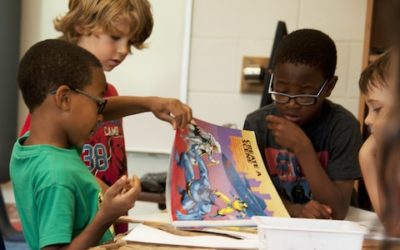We’re often asked to give suggestions of activities or jobs that might be bad matches for people who are dyslexic, but the best answer is almost always, “It depends.” Dyslexic people tend to excel in creative activities that may include some or all of the MIND strengths (Material Reasoning, Interconnected Reasoning, Narrative Reasoning, Dynamic Reasoning). Difficult activities for dyslexics tend to include secretarial work because of its demands on proofreading and transcription, and rote repetitive jobs that require that tasks be done the same way every time. However, there are few absolute prohibitions when it comes to different activities or fields. In many fields or careers, challenges may arise, but in most cases these can be overcome with workarounds, technology, partnering with someone else, or […]
Don’t Do This: Dyslexia in The General Classroom [Premium]
With all the demands that teachers face regarding classroom management, and the pressures getting students up to speed in reading and math, dyslexic students may find themselves experiencing additional stress from common classroom practices. We now know that as a group, dyslexic children are more emotionally reactive than their classroom peers (UCSF research). In addition, we know that over half of dyslexic adults experience symptoms of post-traumatic stress disorder when returning to school settings as parents. In the the Dyslexia at School study from Dyslexic Advantage, 43% of parents surveyed reported that their student was punished because of dyslexia-related challenges. What were some the punishments recorded? – given extra homework – physical seclusion (work in hallway or closet) – singled out in classroom […]
The Unexpected Nature of Dyslexia [Premium]
Dyslexia Wars: Attack on Dyslexia Definition
A brief note about about an article in Hechringer Report (also published in Scientific America). It is attacking the "unexpected" difficulty in reading (in the presence of average or above-average IQ) that has been a part of the dyslexia definition since its...
Dyslexic Toymakers and Gamemakers
Many dyslexic kids and adults are great at games - all sorts of games. Not surprisingly, some decide to make games themselves and then some choose careers in some aspect of the game industry. There may be an ability to see game play from multiple perspectives...
Dyslexic Storytellers [Premium]
Although many of the physical and mechanical aspects of writing are difficult, many of the greatest writers of all time are dyslexic. Why does storytelling come naturally to so many? Dyslexic people have powerful emotional, personal, multisensory memories. As a result, it’s easy to recall the sights, sounds, smells, and feelings of the past and once the hurdles of getting information down on a page are overcome, stories can come to life for others. Not everyone has these gifts – in fact, a lot of people don’t. A common dyslexic strength is “episodic simulation”. The word “episodic” refers to what scientists refer to as episodic memory, memories for episodes or experiences that have a specific place and time. Our surveys of dyslexic and […]
Emotions: Name Them to Tame Them
One of the most neglected issues in the field of dyslexia is the topic of social and emotional health. We now know that as a group, dyslexic people are more emotionally sensitive than non-dyslexic people and because emotion memories may be so strong in dyslexic...
Asynchronous Development [Premium]
Asynchronous development refers to an unevenness in development which may include wide differences in various aspects of cognition, physical development, and emotional development. The unevenness in these different aspects of development can create paradoxes (being ahead in some abilities as well as behind) and opportunities as well as stress. Asynchronous development was first introduced in the academic and educational literature in the context of gifted children – children who showed wide discrepancies between strengths and weaknesses and who were sometimes referred to as being “twice exceptional”. In the figure below, an example of score variations is seen in a gifted student with dyslexia. Where the standard scaled score for age is 100, this student had strengths in verbal comprehension with a score of […]
Should I Help with Homework? [Premium]
“His mother had read everything to him and in medical school his wife was reading aloud all books and references…there was some opposition to his continuance in medical school on the part of the dean and one other faculty member, but the opposition subsided… After his graduation a report came from a distant medical school hospital stating that this man was the best intern they had had for some time. He passed his American boards in internal medicine and became the head of a group practice clinic in a large city…” — Lloyd Thompson, Reading Disability Should you help with homework? The answer is YES. There is a qualifier on that – you should help but only to the point that you’re helping your student […]
My Child Won’t Go to School: What to Do About School Avoidance
By Dr. Dan Peters of Summit Center "Things were fine last year and now he wakes up with a stomachache and says he doesn’t want to go to school. It takes me forever to get him out the door. We are often late. He ends up screaming at me and telling me I am the...
Super Teen Sophia Transforms Dyslexia Awareness in Oregon
"Just knowing the reason why you're having these issues makes a difference psychologically...that alone was kind of refreshing..." — Sophia, 16 Energized by her own recent identification of dyslexia, homeschooled teen Sophia decided to spread positive awareness of...
Helping Your Student with Intensity [Premium]
“Challenging behavior is just a signal, the fever, the means by which the kid is communicating that he or she is having difficulty meeting an expectation. “ — Ross Greene, The Explosive Child The difference between the experience of one student and his or her dyslexia can vary a great deal depending on temperament. In psychology, temperament refers to consistent differences in emotional disposition and behavior that are biologically-based and relatively consistent over time. Temperament is part of a person’s personality, which also includes intelligence, humor, interests, and talents. Among the various temperamental differences, certain “difficult temperamental traits” may make some school experiences (like remediation or pull-out) difficult to accept. Examples of difficult temperamental traits include: negative responses to new people or situations, slowness to […]

![Is There Anything I Shouldn’t Do? [Premium]](https://www.dyslexicadvantage.org/wp-content/uploads/2024/02/is-there-anything-not-do-400x250.png)
![Don’t Do This: Dyslexia in The General Classroom [Premium]](https://www.dyslexicadvantage.org/wp-content/uploads/2024/02/Dont-Do-This-Dyslexia-in-The-General-Classroom-Premium-a-1-400x250.jpg)
![The Unexpected Nature of Dyslexia [Premium]](https://www.dyslexicadvantage.org/wp-content/uploads/2024/02/Unexpected-Nature-of-Dyslexia-DA-362x250.jpg)


![Dyslexic Storytellers [Premium]](https://www.dyslexicadvantage.org/wp-content/uploads/2023/12/DYSLEXIC-STORYTELLERS-e1702709403878-305x250.jpg)

![Asynchronous Development [Premium]](https://www.dyslexicadvantage.org/wp-content/uploads/2023/12/bell-curve-400x250.png)
![Should I Help with Homework? [Premium]](https://www.dyslexicadvantage.org/wp-content/uploads/2023/12/Should-I-help-with-homework-da-400x250.jpg)


![Helping Your Student with Intensity [Premium]](https://www.dyslexicadvantage.org/wp-content/uploads/2023/11/Helping-Your-Student-with-Intensity-Premium-1-400x250.jpg)













